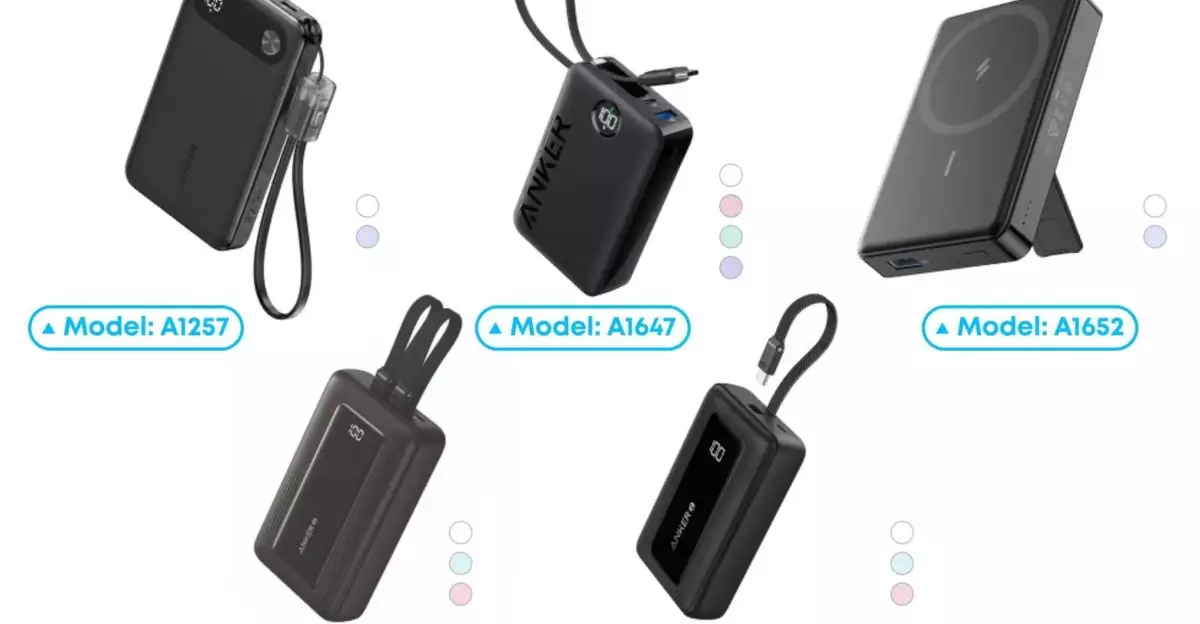In the age of portable technology, power banks have become indispensable companions for many. However, recent developments regarding certain Anker power banks have raised serious safety concerns that cannot be overlooked. Anker, a reputable brand known for its high-quality electronic accessories, has issued a call to action for users of specific models, namely their MagGo and Zolo power banks, encouraging them to dispose of these devices immediately due to alarming risks of overheating and potential fire hazards. This story isn’t just about a company recalling flawed products; it is a stark reminder of the hidden dangers lurking in our tech gadgets.
Anker’s Pressing Recall Announcement
Anker’s announcement marks its second product recall within a single month. The company has listed five additional power bank models—including two from the MagGo line and two from the Zolo series—that have been flagged for serious safety issues. According to Anker, while the possibility of these devices malfunctioning is low, the company is prioritizing user safety by voluntarily recalling the problematic models. This move might reflect heightened scrutiny and reliability within tech industries, but it also points to an underlying issue with quality control that must be addressed.
Identifying Affected Products
The affected power banks are: Anker Power Bank (models A1257 and A1647), Anker MagGo Power Bank (model A1652), and Anker Zolo Power Bank (models A1681 and A1689). Identifying your product involves checking the model number, usually located on the device’s back or side. For those who may not regularly monitor news about their devices, this recent alert could easily fly under the radar, leaving many consumers unaware of the need for immediate action—a troubling reality in an age where convenience often overshadows safety.
The Path Forward for Consumers
In addressing the issue, Anker has offered affected customers in the United States two options: a complimentary replacement power bank or a gift card for future purchases on their website. Consumers can initiate this process by filling out a recall claim form on Anker’s site, accompanied by either a product serial number or proof of purchase. While the company’s proactive steps to remedy the situation are commendable, the lack of specific recall timelines for the newly flagged models raises questions about transparency and can create uncertainty among users.
In a related vein, customers also need to be very diligent about properly disposing of these problematic devices. Anker cautions against merely tossing the power banks in trash cans or recycling bins, instead recommending that they be taken to facilities equipped to handle lithium-ion batteries. This precaution underscores the importance of not just consumer vigilance but also the responsibility of manufacturers to ensure that their products remain safe throughout their lifecycle.
The Broader Implications of Anker’s Recalls
The series of recalls highlights a significant challenge within the tech industry: the reliance on lithium-ion batteries. Although these batteries power many of our favorite devices, they can pose serious safety risks if manufacturers do not maintain rigorous quality control throughout their supply chains. The U.S. Consumer Product Safety Commission has already received reports indicating over a dozen incidents of fires and explosions tied to Anker’s earlier recall, amplifying the urgency of addressing such compliance issues.
Regulatory authorities across various countries are closely monitoring the fallout from this situation, ensuring Anker’s compliance with local guidelines for product safety. This intensified scrutiny can signal a watershed moment—a wake-up call for the broader tech landscape to prioritize consumer safety over profit margins and efficiency. As customers, it is crucial that we advocate for transparent practices from companies that hold our trust.
It is high time for brands like Anker to rise to the occasion, not just to rectify current failures but to pave the way for a future where technology and safety coexist harmoniously.

